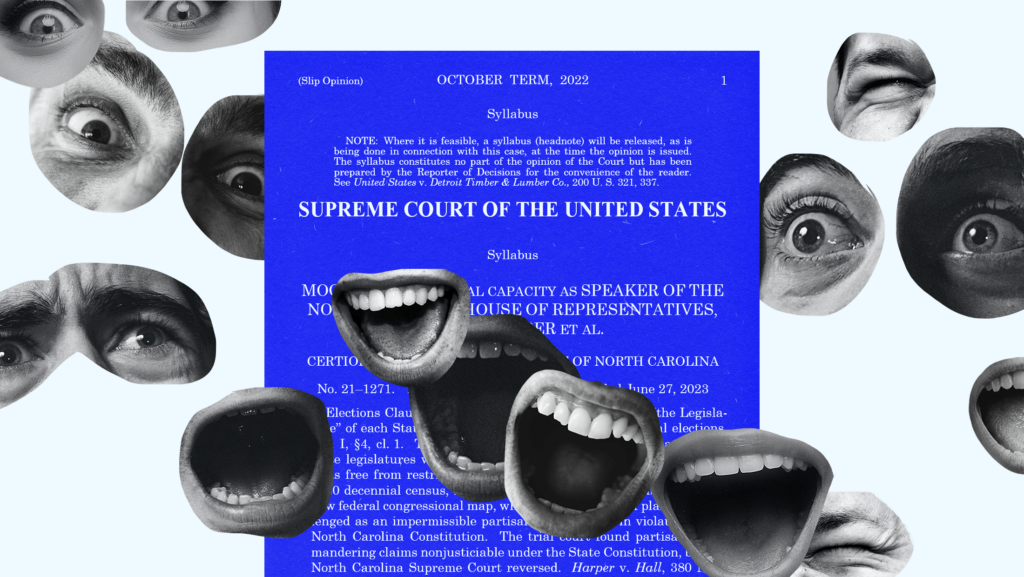Revisiting Moore v. Harper and the Threats to Democracy

In the final week of its term, the U.S. Supreme Court unmasked the so-called independent state legislature (ISL) theory for what it was: a crackpot idea without judicial support. In a 6-3 decision, Chief Justice John Roberts wrote: “The Elections Clause does not insulate state legislatures from the ordinary exercise of state judicial review.”
Since then, Republicans have largely been muted in their response. A few suggested that they would continue to fight against expanding voting rights.
Tim Moore, the Republican speaker of the North Carolina House of Representatives who brought the case to the Court, was uncharacteristically gracious in defeat: “Today the United States Supreme Court has determined that state courts may rule on questions of state law even if it has an impact on federal elections law. Ultimately, the question of the role of state courts in congressional redistricting needed to be settled and this decision has done just that.”
Most of those who litigated Moore v. Harper are simply relieved the case is over. As for the broader impact of the case, I offered my opinion the day after the decision. A dangerous legal theory had been rejected and “[a]nyone who cares about free and fair elections should rejoice.”
Not everyone in the pro-democracy camp agreed with me. Some insisted that the 6-3 victory was, in fact, a secret defeat. In the words of one prognosticator, Moore contained a “ticking time bomb” for future Supreme Court interference in state court election cases.
On the other side were those who overhyped Moore as singularly historic. One conservative former federal judge called the decision “the single most important constitutional case for American Democracy since the Nation’s Founding almost 250 years ago.”
We cannot let the focus on this one case, as important as it was, obscure the fact that threats to our democracy come in many forms.
Liberal critics of the decision in Moore point out that it contains language suggesting that the Court could, in some future case, hold that a state court has overstepped its bounds of interpreting and applying state law. But that isn’t new. Though rare, federal courts have asserted and exercised that power before. There is nothing in the Court’s opinion that suggests any new standard. Indeed, the majority expressly declines to establish any specific test.
Pundits who decry that Moore planted the seeds of future destruction are cynically out of step with reality. Moore is a significant victory for voters in the here and now. As a result of the Court’s ruling, 28 active state court voting and redistricting cases can continue unimpeded by the ISL theory.
Liberal hand wringing about its latent dangers that someday might materialize misses the point. Pro-democracy wins need not be infallible or permanent to be important, and we do ourselves no favors by overlooking significant victories for fear of impending defeats.
It is wrong, however, to claim that Moore is somehow the most important pro-democracy case ever decided. Baker v. Carr established the principle of one person one vote. Various other cases established the primacy of the right to vote and recognized Congress’ constitutional power to protect minority voting rights and the Voting Rights Act. In its broadest interpretation, Moore simply reaffirmed the principles of judicial review first articulated 220 years ago in Marbury v. Madison.
Moore isn’t even the most important case involving presidential elections. Bush v. Gore — the original case that started the right-wing down the ISL rabbit hole — led to the seating of a president who otherwise lost the popular vote. While former leaders of the Federalist Society’s takeover of the judiciary might look past Bush, liberals remember it all too well.
If Moore wasn’t the blockbuster its supporters laud or its critics fear, then what was it?
Moore, like Allen v. Milligan — the Alabama voting case also decided by the Court this term — was a victory for the status quo in a world where we fear a conservative Supreme Court will upend established precedent to roll back the clock on progressive policies. Both cases involved right-wing lawyers advancing novel interpretations to undermine fundamental protections for voting rights. And in both cases the Court ruled in favor of democracy by rejecting those conservative attacks.
Like the 60 plus courts that refused to indulge former President Donald Trump and his allies’ attempts to disrupt the peaceful transition of power, the Court in Moore refused to indulge right-wing attempts to disrupt our fundamental system of checks and balances. This is no small victory. This is a Court that in other areas proved willing to cast aside settled precedent and the fundamental rights they protected. Status quo is not something we can afford to take for granted.
But Moore hardly puts an end to the ongoing threats to democracy. Even as the debate over the impact of Moore continues, Republican legislatures, including in North Carolina, are enacting new laws to undermine free and fair elections. Supporters of the “Big Lie” continue to degrade our election systems. And courts continue to consider and hear critical cases that will have an enormous impact on the 2024 election.
Sadly, if conservative judges want to undermine voting rights, there are ways for them to do it other than to deploy a clumsy theory like the ISL theory. We cannot let the focus on this one case, as important as it was, obscure the fact that threats to our democracy come in many forms, and the judiciary continues to guard the gates between the “Big Lie” and free and fair elections. There will always be new cases with new theories to threaten democracy. Voting rights lawyers fight these cases day-in and day-out — winning some and losing some.
Moore v. Harper was a victory for democracy. It was an important repudiation of a radical fringe theory that could have immeasurably damaged our country. Let’s celebrate it for what it was and focus on the challenges ahead.